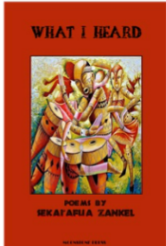Sekai’afua Zankel’s What I Heard is a refreshingly frank collection of poems addressing the failure of contemporary society to protects its most vulnerable members whether they are Black Americans, the elderly, and/or women. Amidst the hard-hitting poems, Zankel illustrates an abundant capacity for grace, humor, and wisdom. She is an inimitable voice on the Philadelphia poetry scene, and this chapbook is a perfect encapsulation of her voice.
“I heard Sarah Huckabee Sanders Speak on the ‘Little Rock Nine’” is a visceral poem exploring the intersection of generational racial trauma and contemporary American politics. The Little Rock Nine refers to the brave Black students who were the first to integrate Central High School in Little Rock, Arkansas. This historical event happened well within living memory; it happened in 1957. Zankel expertly deploys a communal voice that incorporates both the past and present:
Sarah had no sorrow in her voice. I looked around for one friendly face
for hope. I saw a lady, kindness filled my heart, and then she spat on me.
I got scared when my dress was torn violated by hands. I settled
on one thing and that was home, had to get back there no matter how.
The speaker realizes “It is insensitive of me to assume Sarah should speak on my behalf” and finds a path forward for herself as well as all Americans through utilizing famous advice from Mother Theresa : “It’s no time for tears there is work to do.”
In the narrative poem “Those Who Are Marked,” Zankel manages to walk the tightrope between humor and pathos. The speaker recalls her grandmother “with the biggest corns ever seen” watching “Billy Graham speaking loud on reruns that Sunday morning” while wanting “to get out of the room quickly. I can’t stand religious TV.” The grandmother shows clear signs of memory loss and asks, “Is FDR coming on tonight”? This leads the speaker to ruminate on social security and other welfare programs and their current state of decline: “So many people died this year without insurance, no food stamps or heat, / and the newspapers made a point to warn people not to get sick, to keep / their hands clean.” Reflecting the fact that there is no clear solution to the inadequacy of social welfare programs, the speaker muses “I worry about what is going on with sickness and disease. Old age burial / practices are not factored into modern living. She closer her eyes as I sat / down next to her, and all I could reflect on was numbers.”
In this collection, Zankel makes poetic space for women who defy societal conventions. In “At the Bottom,” she writes about a woman who decides to make her own life decisions and move to California, “on the coast.” Her reasons are unexplained, mysterious, and that mystery is why this poem will continue to haunt me long after I have read this chapbook. Zankel offers some explanation:
She must have lost her temper.
She made an awful decision,
and might have gone looking for it,
when she swam to the bottom of the sea.
Zankel’s gift for humor really shines in “Who Are They Who Are Watching Me Watch Them?” She begins,
Are they screwing? No, they will say they’re making love
in a sunlit room in the middle of an afternoon.
Each window in the whole house is wide open, and I can see everything!
I’m getting excited playing with the dog on top of the bed and laughing.
Witnessing the curtainless indiscretion of her neighbors, leads the speaker to ruminate on that big question of mortality: “We are all on that path to death, and yet some complain about it, like / after making love with someone. Some people pretend, avoiding sleep, / escaping whatever they can, not to mention it too loud.” After her musing, the humor comes roaring back in the final line: Get down off the bed, Walter! In this poem, Walter is not identified, adding layers to the humor.
What I Heard is one of the most original chapbook collections I have read. Zankel deftly interweaves humor, tragedy, and personal and collective experience with a unique voice and vision. Reading this chapbook is a rewarding experience with a speaker who comes across as a trusted friend.
Sean Hanrahan is a Philadelphian poet originally hailing from Dale City, Virginia. He is the author of the full-length collection Safer Behind Popcorn (2019 Cajun Mutt Press) and the chapbooks Hardened Eyes on the Scan (2018 Moonstone Press) and Gay Cake (2020 Toho). His work has also been included in several anthologies, including Moonstone Featured Poets, Queer Around the World, and Stonewall’s Legacy, and several journals, including Impossible Archetype, Mobius, Peculiar, Poetica Review, and Voicemail Poems. He has taught classes titled A Chapbook in 49 Days and Ekphrastic Poetry and hosted poetry events throughout Philadelphia.


